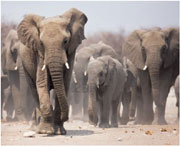

Homicidal teen elephants may explain impact of mass incarceration, single parent homes
By Dr. Boyce Watkins
A study that took place at the Pilanesberg game reserve presented scientists with serious dilemma: Why were teen elephants randomly murdering rhinos?
Rhinos were being found with serious wounds, gaping holes in the shape of elephant tusks. The trampled trees at the scene of the “crimes” let scientists know that elephants were likely responsible for the homicides. Greg Stuart-Hill, the chief ecologist of the region, said that he was sure that the elephants who’d been killed were falling victim to the same group of predators.
The killings were not natural. Elephants don’t normally kill Rhinos, except in instances where they feel that their young are being threatened.
After doing an investigation, scientists found a group of teenage elephants who tried to kill a Rhino right in front of them. They tracked the gang of three, shot them all and the killings stopped.
They soon realized that the reason the teens were engaging in random killings is because the ecosystem had been thrown out of balance. Normally, mothers drive their male children from the herd around 15-years- old. The males then typically join up with a gang of other elephants, who are led by a male who “keeps them in check.”
The problem was that, in the reserve, there was no adult male to serve as a role model to the young elephants, which led to the violence and chaos that eventually ensued. The animals would aggressively test their strength on other animals, leading to several rhinos being killed.
Clive Walker, chairman of the Rhino and Elephant Foundation of Africa, says that the teen elephants’ behavior was primarily driven by childhood trauma from watching their parents being slaughtered, and also by a lack of parental authority during their developmental years. Many of them had been displaced to protect them from hunters who’d killed their loved ones.
I am not an expert in animal science, but it is difficult not to see parallels between what happened at this animal reserve and what is happening to millions of Black families across America.
The War on Drugs, which began in the 1970s, had a huge impact on the structure of the Black family in America: Many of us were becoming addicted to the drugs, incarcerated for selling/possessing drugs or victims of the violence surrounding the drug trade.


Be the first to comment